Stephen Blumenthal, Jose Hevia Get Project Outside UDB OK’d
From left: Jose Hevia and Stephen Blumenthal along with a rendering of the planned industrial complex outside the Urban Development Boundary (Coral Rock Development, Aligned Real Estate Holdings)
It took developers Stephen Blumenthal and Jose Hevia five tries, but in the end they won approval for their controversial proposal to build outside Miami-Dade County’s Urban Development Boundary.
Commissioners on Tuesday voted 8-4 to allow the South Dade Logistics & Technology District to be built on 379 acres on the southeast corner of the Florida Turnpike and Southwest 122nd Avenue in an unincorporated area of south Miami-Dade. The UDB is a greenbelt along Miami-Dade’s developed areas meant to limit encroachment of new construction onto farmland, wetlands, the Everglades and Biscayne Bay.
For over a year, the plan had divided commissioners and residents. While the developers and their supporters have argued the project will be an economic boon for south Miami-Dade and provide much needed jobs, environmentalists have decried paving over land that they say is vital for Everglades restoration.
Blumenthal, principal of Coral Gables-based Coral Rock Development, and Hevia, president of Miami-based Aligned Real Estate Holdings, have progressively won over commissioners by tweaking plans and sweetening the proposal.
On Tuesday, they raised the ante even more and secured the final vote they needed. The developers vowed to donate 622 acres of land to Miami-Dade’s Environmentally Endangered Lands Program, a county initiative to preserve wetlands and other properties deemed environmentally vital.
Blumenthal and Hevia first offered the EEL donation at the last commission meeting on Oct. 18, but this time they doubled it from the previously proposed 311 acres.
“The way that this application was presented at first, in my view, was a complete abomination,” said Raquel Regalado, the commissioner who flipped her vote to a ‘yes’ after previously opposing the project. But “as we sit here and discuss an application that actually considers providing something for the environment, I think that’s a step forward.”
Because moving the UDB is among the most controversial proposals a developer in Miami-Dade can make, it requires a two-thirds vote by the 13-member county commission. (Regalado was the eighth vote on Tuesday. Usually, nine ‘yes’ votes are needed, but the math changed with Commissioner Joe Martinez’s suspension from office in September after he was arrested over corruption charges.)
In previous concessions, Blumenthal and Hevia also reduced the project’s size to 6 million square feet from 9.3 million square feet on 793 acres. They also have vowed to pay workers 10 percent over the living wage, said Pedro Gassant, an attorney for the developers.
The duo, who submitted their application last year, pushed for deferrals at several meetings this year after it was clear they didn’t yet have the necessary number of votes. Commissioners deferred a decision on May 19, June 1, Sept. 22 and Oct. 18.
As part of their push, South Dade Logistics’ developers have argued that their project actually will be environmentally beneficial. They would connect the project to mainline sewers, while the site now can be developed with a packing house on septic tanks, which could cause environmental pollution, Gassant said. Plus, the site has arsenic contamination above permitted levels, which would cost the county $47 million to clean up. The developers will remediate at their own expense, he said.
The deal also gives owners of farmland on the site an opportunity to sell property that soon might not be farmable because it’s low-lying and endangered from sea level rise, commissioners who support the project have said.
“It is not environmentally sensitive land. It is an area that is toxic,” commission Chair Jose “Pepe” Diaz said. “Farmers have used it for tree farming because they can’t do anything else because of saltwater intrusion.”
Yet, the notion that the developers are doing the county a favor by cleaning up arsenic on the property is a “red herring,” responded Laura Reynolds, of the Hold The Line Coalition that fights UDB expansions. “Every piece of land we have has naturally occurring arsenic,” she told commissioners.
Reynolds has argued that Miami-Dade has enough industrial development land within the UDB, and the South Dade Logistics site specifically, is important for future farming needs.
Ultimately, approval amounts to an “incredible land grab” by the developers, as moving the land in the UDB immediately increases its value by more than $46 million an acre, said commissioner Danielle Cohen Higgins, who voted against the proposal.
Not only does Miami-Dade have existing vacant warehouses, but the viability of South Dade Logistics is questionable in light of Amazon scaling down both its warehouse purchases and leases, Cohen Higgins said.
South Dade Logistics is the latest project to highlight the contention of developing in south Miami-Dade, where even properties within the UDB have been caught in the crossfire.
The Miami Wilds project, stalled for a decade largely because of environmentalists’ pushback, seemingly was in the clear this summer when the developers leased the site from the county. But in October, the Bat Conservation International and Tropical Audubon Society, as well as Tropical Audubon President Jose Barros, sued the county for allowing the project, potentially putting another twist in plans.
Regalado, the commissioner who flipped to a ‘yes’ vote on Tuesday, said that the tweaks to South Dade Logistics’ proposal show that ultimately the conversation doesn’t always have to come down to pitting development and job creation against land preservation.
“I hope and I think,” she said, “that we have come a long way in saying, ‘It’s either the economy or the environment.’”



